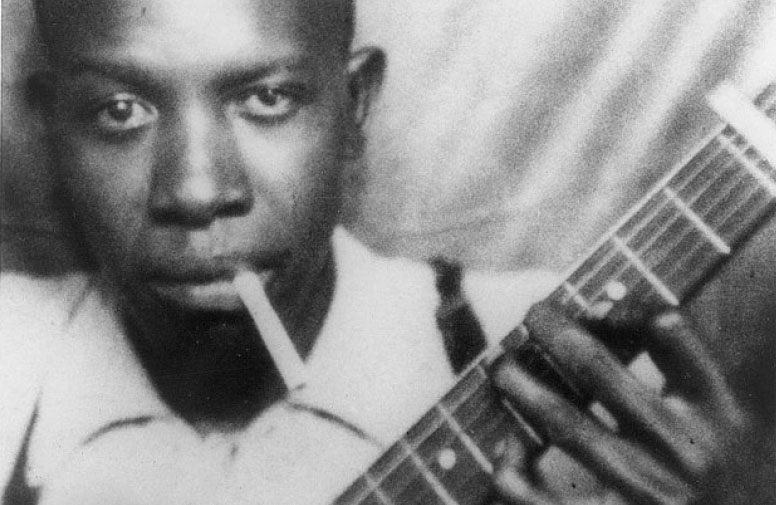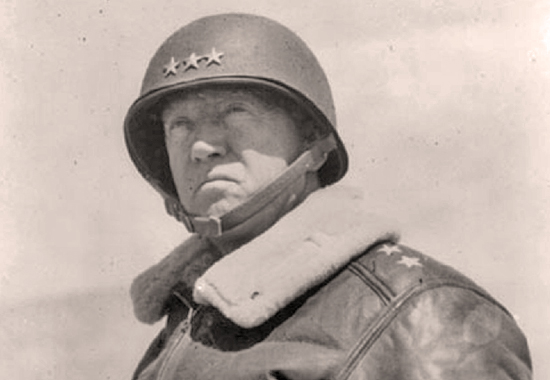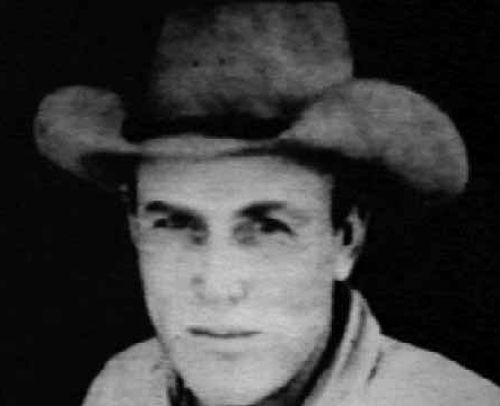George Smith Patton Jnr.
A photo taken of Patton during the initial success of the Western Offensive. A major proponent of forward offence, Patton took inspiration from the then recent success of the Russian assault into Germany. In doing so however, Patton would make similar mistakes as the Russians have, to similar, catastrophic, results.
In 1944, George Patton would complete his retreat back to California after the disastrous Western Offensive. In an action that was hoped to be the first step in reunifying the country, the Californian-led assault would instead prove to be a major blow for the short-term reunification hopes of many and would also be a major factor in preventing California from becoming a major player in North America until the late 1970's.
Patton was a graduate of West point and had faithfully served the United States throughout his life. He would push for greater mobilisation and his own standing grew as he gained a reputation as a forward thinking, anti-anarchist officer who believed in a strong offensive above all else. During the Bryan and Glass Administrations, he would be promoted to colonel, before being transferred to his native California in the hopes that he could bring the state to heel.
Patton arrived in California in the aftermath of Bloody Friday and found the mood of the state and the army itself distinctly anti-federal in thought and mood. As events turned sour quickly in the east, California also considered itself independent enough to avoid being pulled into the mess that was the fighting against the Confederacy and the rising socialist triumvirate states. California would never actually officially secede from the government, instead simply sorting out its own affairs by getting a sphere of influence along the west coast.
For Patton, this ranked of cowardice in his eyes and he was only prevented from resigning as the Californian government needed officers to staff its army. Assured that the reunification of the States was a priority, Patton took the position of a colonel in late 1933, rising to General throughout the decade. During that time, California got an influx of refugees from the Midwest and with them, new recruits for the military.
As Patton trained his army, there was increasing discontent among the officer class as it appeared that the Californian government was dithering while the rest of the former United States was left to rot, especially the Midwest. An opportunity was being squandered to retake the former States and reclaim the country were the thoughts of Patton and his clique of officers. Even as the refugee crisis began to die down and California cemented its control over the West Coast, this still wasn't enough for the officers.
Having sworn an oath to the United States of America, not California, the cabal of officers decided the best way to fulfil that oath was to stage a coup against the government in Sacramento so they could rebuild the United States. The coup was launched in 1940, having the support of much of the military and it succeeded in taking over the state, California now being run by a dictatorship. Patton got what he wanted with a commanding position of the armed forces and began to plan for a major assault into the south-western states that would see them be brought under California's control.
The coup, and subsequent build up of the military put other states on edge though, especially Texas. While many lamented the fall of the United States, few wanted it to be recreated on a military conquest. With Patton being the most stand out personality among those who served as the cabal, his belligerence and known militaristic attitude put many other states on edge as they saw him as an unhinged factor.
The plan that settled on was to secure the south-west of North America up to Texas, securing large swathes of territory and robbing the latter of any area of influence. With this territory secure, California would then be able to negotiate aggressively with other states to restore the Union with the focus on Texas, believing that they could bring the west and Midwest under control with a direct show of force. Patton was a leading strategist in the eventual plan, deciding on what steps to take to take control over the territory. Two years of training, gathering forces and purging the military of those who had opposed the coup followed before the cabal believed they were ready.
The military build up in California did not go unnoticed and with the strong words coming from the cabal about how they sought to make a new United States government, there were many who would decide it would be best to oppose such a movement before it gained steam and dictated terms to them. With many believing this would be a war of conquest as opposed to liberation, preparations were made to counter this.
The spring of 1942 saw Californian troops begin their assault into eastern Nevada and then pushing onwards, experiencing little resistance, at first. Advancing onwards into Utah, the Californian forces would engage with the Utah militia, a group of mostly Mormon soldiers that feared for their own independence in the face of the overwhelming military assault by the Californian military. Attempts to negotiate had faltered in the face of the cabal insisting that Utah would help feed the war machine that would take control of the region.
Not wanting to enter into such an unequal partnership, Utah rejected the offer and was subsequently invaded, the state being overrun by the much larger Californian military in a series of running battles. When Salt Lake City itself was bombed by planes, the leadership of Utah agreed to surrender. The damage wasn't great, but it proved to be a shock to people living there, suffering from the violence that they had managed to avoid so far.
With Utah seemingly secure for now, Patton then led his forces onwards to cement control over Arizona, which had seen Texas try to claim influence over it. It was here that Californian forces would experience the first major resistance of the campaign, running into guerrilla bands that used hit and run tactics against the much larger army. The logistics of the Californian army came under the lion's share of these attacks, aided by partisans in Utah as well as the resentment of being forced into aiding the Californian war machine turned into outright resistance from several groups.
Although Arizona was an area that Texas had influence over, the leadership of the latter instead allowed California to invade as they funnelled weapons and men into resistance groups to help bleed the Californian forces in the area. Despite that though, the winter of 1942 saw California dominate Utah and Arizona with the final piece of New Mexico having to be delayed until 1943. It was at this point that the cracks first started to show in the Californian army as the logistical capability of the organisation could not match with its pace and numerous institutional flaws soon became evident.
Having to spend the winter rebuilding their organisation, the Californian government started to see its position weaken at home. The coup had seen widespread resistance outside the military with protests breaking out. The military cabal had come down hard on these initial protests, but dissent still simmered. With the mounting losses and controversial actions during the Western Campaign, this dissent grew and more forces were brought back to help keep things under control in California itself.
Added to this was an uprising that began in Utah on New Years Day of 1943 as weapons from Michigan and Texas had found their way into the hands of the Mormon Liberation Front. Although the government had surrendered rather than risk the destruction of Salt Lake City, bands of fighters gathered to harass Californian supply lines. The uprising soon spread throughout Southern and Central Utah, forcing the Californian army to spread its resources even thinner.
To counter this, Patton responded with a sledgehammer approach. Any attack against his supply lines was hit back with overwhelming force against any suspected area which held partisan fighters. Patton made his thoughts clear on the subject in a speech by deeming any group which fought against the Californian army to be committing crimes of treason against the legitimate United States government and, as a result, were to be treated as traitors.
The speech caused backlash against California from all fronts, seeing as how the government of that particular state had gained its powers through a coup rather than an election and was trying to reclaim the United States through a war of conquest. Resistance would double as more supplies were fed into Utah's partisans and Texas would step up its efforts in New Mexico to build up a line of defence through its own supported resistance groups.
The chaos in Utah delayed the Californian offensive into New Mexico until June of 1943, by which time, the defences of New Mexico had been built up considerably. Although the Californian army had the strength advantage, the pressure by the Utah partisans and the increased defences by opposition forces blunted their drive. The lack of a decent supply network for such an outcome also showed as the Californian army simply couldn't handle the demands made of it towards the end of the year.
Unable to take New Mexico and resistance solidifying, threatening the very stability of Californian supply lines, the army was forced to pull back to try and regain its footing. It was at that point that the Texan army, armed with Michigan weaponry, struck. All along the New Mexico front, the Texan army struck at the over stretched Californians and forced them out of the state. The retreat became a rout as the Texans carried their charge into Arizona as well. Coupled with the collapse of their logistical capabilities, the Californian army was eventually forced back into Nevada itself, Patton leading the rearguard as the year ended and 1944 began. In their wake, Texas now had complete control over Arizona and New Mexico while forging an alliance with the re-established Utah government.
As Patton led the last of his defeated troops into California, it retained only its influence in Nevada from the outset of the war, the rest having fallen to Texas. Protests broke out once the sheer scale of defeat was found out that were bloodily repressed. The soldiers, having believed that those opposing the war had been responsible for many of the army's shortcomings, had their anger directed towards the anti-war factions by the officer class, claiming that supply issues were due to sabotage at home.
Although the army managed to retain control of California, Patton was still used as a scapegoat for what shortcomings propaganda couldn't hoist onto saboteurs at home or clandestine actions from enemy states. Patton was brought before a tribunal and discharged from the army for his failures. He would go onto live in quite retirement until his death in 1962, writing several books on military tactics and articles defending his actions.
Patton's leadership of the Western Offensive has been criticised and praised in equal measure. His courage, tenaciousness and tactical ability are given credit for allowing the offensive to be as successful as it was. His lack of logistical skills, unwillingness to acknowledge mistakes and lack of tact or diplomacy were major flaws which only helped doom the campaign as it amplified already existing flaws.
The Western Offensive has been criticised as a mass of poor-planning and wishful thinking on a colossal scale. The amount of opposition that came to be wasn't factored in as several in the cabal seemed to believe that they would be greeted as the true form of government in America due to their mission and beliefs. When that didn't come to pass, no change in strategy was made as ideology blinded the cabal into believing that Americans of all stripes would rush to their cause once they appeared in the area, ignoring the fact that local control of many areas had passed towards governments that preferred their new independence over being dictated to by Sacramento.
Poor logistics and supplies became a large factor in the failure of the Western Offensive as time went on, Patton's constant drive for the offensive increasing the difficulties that the Californian army was facing in supplies. When the Texan counter-offensive began, there was little in reserve that could be used to blunt the attack. Although it could be argued that Patton was doing the best out of poorly designed strategy, he was nevertheless one of the planners for said strategy and his role as commander only brought the flaws to the forefront. His bullish speeches also turned many away on the diplomatic front as they gave no leeway for those who were on the fence, forcing everyone to choose a side, many opting to go against California.
The Western Offensive was an expensive failure for California, costing it men, equipment and money that would take a long time to recuperate. Although Nevada remained in its sphere of influence and it retained its place of dominance on the West Coast, the outcome would only give the south-west to Texas, securing that state's dominance of the region until reunification itself. Those who had hoped that this would be the start of the reunification of the states were to only be left disappointed, no others looking to continue with it now that it appeared discredited. At least, by outright military force anyway.
Patton had taken a gamble and lost. He would never live to see the states under one flag again and there are those in California that curse his name to this day, along with the rest of the cabal. A misplaced sense of loyalty made him follow a cause that would only damage the very ideals he fought for. A great military mind, his shortcomings would doom the one major campaign he commanded and allow for the cementing of power blocs over the country. His thoughts on military theory were at least admired and are still discussed by the reunified American army to this day, giving him a more lasting positive impact in one field.


